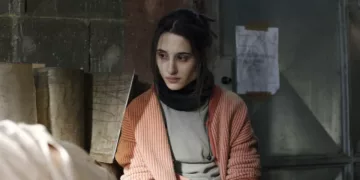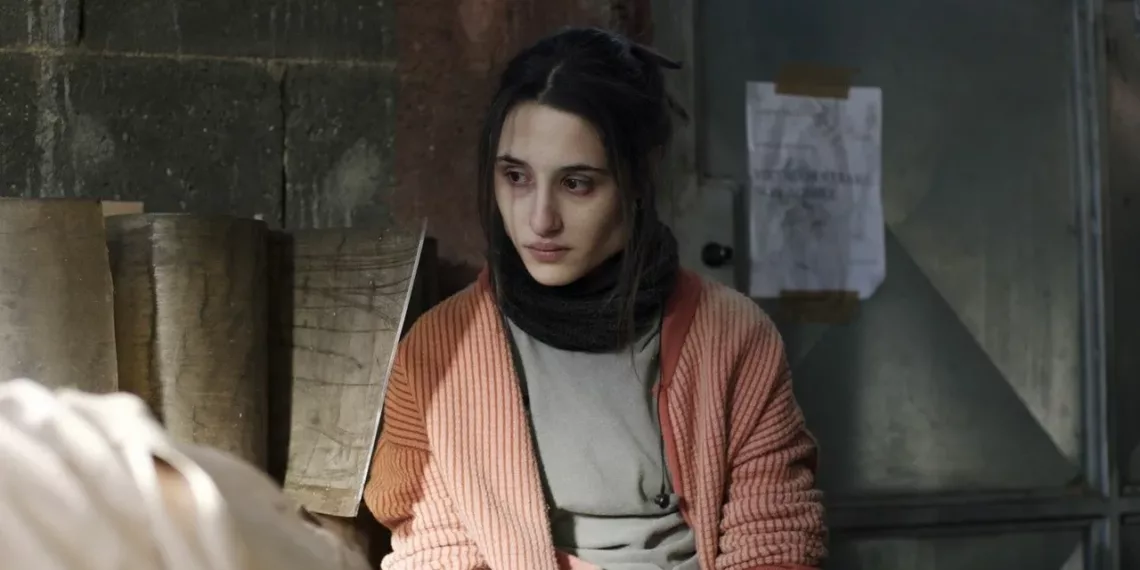Silvia Luzi and Luca Bellino’s 2021 film Luce tells the introspective story of a young woman navigating her emotions and sense of identity. The film centers around Marianna Fontana’s riveting portrayal of an unnamed protagonist who works in a bleak southern Italian leather factory. Struggling with feelings of isolation, she finds an unexpected connection through mysterious phone calls from an unidentified man.
Luzi and Bellino craft a purposefully cryptic narrative to place viewers directly inside the protagonist’s mind. We learn little of the concrete details of her life, instead experiencing her world through her eyes. Constant close-ups and shallow focus emphasize each flicker of emotion across Fontana’s exquisite face. Her environment exists only as a blurred backdrop, prioritizing internal reflections over external actions.
This restrictive visual style aims to immerse audiences in the character’s intense psychological journey. Viewers must concentrate on subtle cues to glean insights into her desires, fears, and imagined fantasies. As she grapples with loneliness in her factory routine yet finds solace in mysterious phone conversations, larger themes emerge of how we cope with isolation and construct our personal narratives.
Luce invites reflection on the intricate inner lives we all inhabit beneath the surface revelations of day-to-day reality. In stripping away context, it powerfully reflects the creative—and fragile—nature of how we tell our own stories.
Textured Portraits of Place and Person
The film grips us from the start with vividly textured scenes of its protagonist’s harsh working environment. Luce transports viewers to a spartan Italian leather factory where drab machinery and the scent of animal hides dominate. Rows of women labor under the watch of stern overseers, handling mangled leather for long days with no reprieve.
It’s a bleak setting that conveys the soul-grinding rut of factory work through both its industrial sounds and somber color palette. Scenes of the nameless woman straining at her post in muted blues emphasize the dreary monotony of her daily life. Yet directors Luzi and Bellino never belabor this dreariness; they capture it with economical strokes, allowing our imaginations to feel the suffocating ennui.
Even more striking is how cinematographer Caramella and the directors bring us intimately inside the mind of their protagonist. Nearly constant tight close-ups thrust us right before her expressive face, demanding we interpret each subtle nuance. With surroundings left blurry and indistinct, viewers must decipher entire worlds from eyes, lips, and brow alone.
This claustrophobic visual style heightens our intense connection to the character’s psychological state. When surroundings briefly emerge, cool factory hues contrast poignantly with the warmer tones of phone calls. Through lighting and lens, the filmmakers deftly distinguish between bleak reality and the hopeful intimacies of escapist fantasy.
Across lush textures of sound, color, and flesh, Luce imprints upon viewers unforgettable sensory portraits of its lonely protagonist, from her daily sufferings to her hidden inner life. Immersive and visceral, its chosen visual language proves uniquely powerful for sinking us deep inside a troubled woman’s mind.
Obscured Journey of the Mind
Story is very much a secondary concern in Luce. Directors Luzi and Bellino craft a willfully opaque narrative that withholds concrete details. We’re shown glimpses of the protagonist’s factory work, family gatherings, and phone calls but given little context to piece events together linearly.
This structure reflects the subjective experience of a mind in turmoil. Mirroring the character’s fragmented inner state, the plot serves less to advance what happens than how she perceives and responds internally. Viewers must interpret her shifts in mood and behavior amid an intentionally unclear scenario.
Ultimately, the film illuminates her journey toward realization. Isolated in a loveless routine, she escapes through phone fantasies that expose core needs for intimacy and empowerment. As barriers blur between imagination and reality, she gains insight into inventing her own story outside societal constraints.
The climax—her dawning clarity—highlights how narrative serves the film’s ambition to immerse in one woman’s psychology. Themes like coping with loneliness through alternative realities emerge as she journeys from numb resignation toward recognizing power over her self-definition.
By prioritizing this introspective arc over linear events, Luzi and Bellino craft an elusive but hugely affecting rumination on individual lives obscured beneath the surface of daily life. Their protagonist’s story resonates by reflecting our perpetual inner narratives that give meaning amid the mundane.
Beneath the Surface: Marianna Fontana’s Mesmerizing Transformation
At the heart of Luce lies Marianna Fontana’s tour de force performance. With her expressive eyes and subtle gestures, she crafts a richly layered character that anchors the entire film. Through constant close-ups, we live inside her mind, absorbing every flicker of emotion.
Fontana illuminates the nameless woman’s desires for intimacy and fulfillment lacking in her bleak routine. In phone calls with the mysterious man, she finds an outlet, indulging in fantasies that bring fleeting joy. His gentle voice offers comfort and a chance to open up about her daydreams of romance and success denied by her circumstances.
The intimacy between these characters, even across a phone line, feels deeply authentic. Fontana and co-star Tomasso Ragno imbue brief conversations with caring empathy that transforms the relationship into her sole refuge. His assurances that “talking is important” hint at deeper care and responsibility for her wellbeing that uplift dreams into something truly felt.
What’s most stirring is how her performance exposes flickers of repression transforming into self-awareness. From a hesitant smile to fleeting moments of clarity, Fontana charts a psychological awakening with mesmerizing nuance. She breathes vibrancy into a protagonist silenced by routine, culminating in a finale that shakes off resignation’s shackles in a burst of liberation.
Across arresting close-ups relishing every subtle change, Fontana anchors viewers in her character’s visceral journey inward. She illuminates unspoken truths beneath surface silence, cementing her performance as Luce’s emotional anchor and entrance into the mind of a lonely woman finding her voice.
Understated Underscores and Elusive Relationships
While attention rightly focuses on Fontana’s compelling central work, supporting players also leave impressions through subtle touches. The fragile emotions of Luce’s protagonist bubbled just below stoic surfaces, much like its understated soundtrack.
Composers Grosso and Paolini craft a spare but haunting score relying on melancholy strings and solitary trumpet passages. Their melodies evoke the nameless woman’s lingering loneliness without overwhelming her fleeting moments of joy. Instead, notes linger like wistful memories in quiet interludes.
Cinematographer Caramella also wields cool factory hues to potent effect, skewering the dreary monotony of leather work in muted blues and grays. His shaded palate chills the woman’s dreary automation but warms during phone calls, symbolic of her nourished spirits.
Yet for all accomplished individually, attempts to further develop the character’s relationship with the photographer remain somewhat diffuse. While showing fascination with his technology, the nature of their bond stays vaguely sketched, overshadowed by her intensifying conversations.
Overall, supporting artists ably amplify Luce’s invasive interpretation through understated brushstrokes. But their fine contributions also highlight how the film remains resolutely focused on internal portraits over external connections in its fragmentary portrait of a mind awakening.
Cryptic Cinema’s Critical Contemplation
Luce made its debut at a fittingly thoughtful venue, the renowned 2021 Locarno Film Festival. The home of eclectic cinema seemed to appreciate the film’s oblique approach to its protagonist’s journey.
With its mesmerizing central performance from Marianna Fontana and invasively immersive visuals, Luce shows potential to captivate arthouse circles seeking psychological portraiture over clear narratives. Directors Luzi and Bellino offer no easy answers, instead inviting interpretation into one woman’s unfolding self-awareness.
Not all viewers may connect with such elusive storytelling, however. By strategically withholding context and clarity, the film risks frustrating some hoping to easily follow events. But frustration could also stem from reaching beyond surface revelations, much like the protagonist emerges from resignation’s comforts.
Ultimately, Luce stands out more for raising questions than resolving them. It challenges compliance with a straightforward plot in favor of lingering contemplation of the intricate inner lives underneath daily routines. In sparking reflection on how we write our own stories, the film may divide but should continue thought-provoking discussion wherever it screens.
Whether embracing abstraction or desiring more handholding, engaged audiences will find in Luce’s obfuscated chronicle of a mind transforming rich fuel for creative critical consideration and debate.
A Reflection on Inner Lives Revealed
Luce comes to a fitting close by bringing themes of introspection full circle. Through obscure routes, viewers join the protagonist’s journey inward toward new understandings of her place in the world.
The film proves an unusual but powerfully affecting experience. Demanding engagement rather than easy answers sparks contemplation long after credits roll. Memories linger of a woman awakening to author her own narrative and of lives obscured below surfaces.
Carrying such a psychologically weighted story would challenge any actor, yet Marianna Fontana rises superbly to the task. Her nuanced, soulful performance anchors the film, imprinting an indelible portrait of a silenced mind finding its voice. Fontana ushers viewers into obscure territories and guides them unforgettably through one woman’s journey of self-revelation.
Luzi and Bellino craft an unorthodox but moving reflection on lives quietly transforming beneath routines. While frustrating for some, its invitation to linger in another’s inner experiences resonates profoundly. In shining light into obscured lives, Fontana and company leave viewers contemplating the intricate narratives we all author in solitude.
The Review
Luce
Luce is a deeply affecting psychological drama that challenges preconceptions of what a narrative can be. Resolving to illuminate inner lives rather than plot, it transports viewers intimately inside its protagonist's awakening psyche through an evocative blend of performance, cinematography, and elliptical storytelling. Marianna Fontana anchors the film with a nuanced portrayal of a silenced mind finding empowerment, stirring reflection on the interior journeys that underlie our daily existences. While its opaque structures may frustrate some, Luce emerges as a thought-provoking portraiture of the quiet metamorphoses happening within lives obscured from view.
PROS
- Compelling central performance from Marianna Fontana
- Visceral sense of immersion into the protagonist's psychological state
- Evocative visual style and use of cinematography/color grading
- Powerful themes of isolation, personal transformation, and self-authorship
- Invites reflection on inner lives below surface experiences
CONS
- Intentional narrative opacity may frustrate some audiences.
- Relationship with photographer could be more fully developed.
- Requires active participation over clear answers and revelations
- Fragmented nature may not satisfy those preferring straightforward plots.



















































